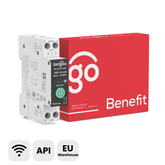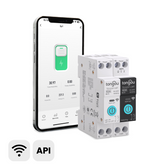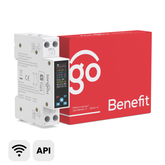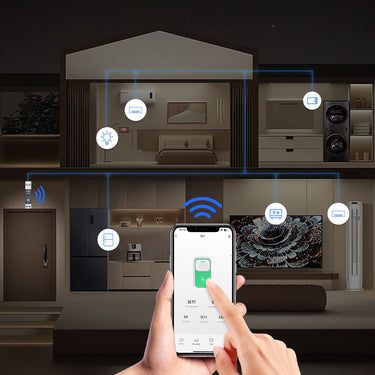What Is RCBO? A Complete Guide to RCBO

In modern electrical systems, ensuring safety and reliability is paramount. One of the crucial components that help achieve this is the Residual Current Circuit Breaker with Overcurrent protection, commonly known as RCBO. RCBOs combine the functionalities of both circuit breakers and residual current devices, providing comprehensive protection against overcurrent and earth faults. This guide delves into what RCBOs are, their working principles, types, advantages, and how they compare to RCDs and MCBs.
What is RCBO?
An RCBO (Residual Current Circuit Breaker with Overcurrent protection) is an electrical protection device designed to safeguard electrical circuits from overcurrent, short circuits, and earth faults. Essentially, an RCBO combines the functionalities of an MCB (Miniature Circuit Breaker) and an RCD (Residual Current Device) into one compact unit. By doing so, RCBOs provide an all-in-one solution for detecting and interrupting both overcurrent and residual current conditions, ensuring comprehensive protection for both electrical installations and users.
RCBOs are often used in residential, commercial, and industrial settings where a high level of safety is required. They are designed to protect individual circuits, thus offering localized protection and enabling quick identification and isolation of faulty circuits.
Working Principle of RCBO
The working principle of an RCBO involves detecting and interrupting abnormal current conditions, such as overcurrent and earth faults. Here’s a detailed look at how RCBOs achieve this:
1. Detection of Overcurrent:
The overcurrent detection mechanism in an RCBO functions similarly to that in an MCB. When the current flowing through the circuit exceeds the rated threshold, a magnetic or thermal trip mechanism is activated. The magnetic trip responds instantly to short circuits by generating a magnetic field that trips the breaker, while the thermal trip responds to prolonged overcurrent by heating a bimetallic strip that eventually bends and trips the breaker.
2. Detection of Residual Current:
RCBOs are equipped with a differential current transformer that continuously monitors the current balance between the live (phase) and neutral conductors. Under normal conditions, the currents in these conductors are equal and opposite, resulting in a net current of zero in the transformer. If an earth fault occurs, the balance is disturbed, causing a residual current to flow. The imbalance is detected by the differential current transformer, which triggers the tripping mechanism and disconnects the circuit.
3. Tripping Mechanism:
When an abnormal current condition is detected, the tripping mechanism rapidly disconnects the circuit by separating the internal contacts. This interruption stops the flow of electricity, thereby preventing potential hazards such as electrical fires, equipment damage, and electric shocks.
Advantages of RCBO
RCBOs offer several advantages over traditional circuit protection devices:
1. Combined Protection:
RCBOs integrate both overcurrent and residual current protection in a single device. This eliminates the need for separate MCBs and RCDs, simplifying the wiring and reducing installation costs.
2. Enhanced Safety Features:
By detecting both overcurrent and earth faults, RCBOs provide comprehensive protection for electrical circuits and users. They reduce the risk of electrical fires, equipment damage, and electric shocks, making them ideal for environments where safety is paramount.
3. Space-Saving and Cost-Effective:
The combination of MCB and RCD functionalities in one device saves space in electrical distribution boards. This compact design is especially beneficial in installations with limited space. Additionally, using an RCBO can be more cost-effective than purchasing separate MCBs and RCDs.
4. Flexibility in Applications:
RCBOs are versatile and can be used in a variety of settings, from residential homes and commercial buildings to industrial facilities. Their ability to protect individual circuits allows for more precise and localized protection, making it easier to isolate faulty sections and maintain overall system integrity.
RCBO vs. RCD vs. MCB
Understanding the differences between RCBOs, RCDs, and MCBs is essential for selecting the appropriate circuit protection devices for specific applications.
1. RCBO (Residual Current Circuit Breaker with Overcurrent protection):
——Protection Capabilities: Protects against both overcurrent and earth faults.
——Primary Use: Offers comprehensive protection for individual circuits in residential, commercial, and industrial settings.
2. RCD (Residual Current Device):
——Protection Capabilities: Detects and interrupts earth faults but does not provide overcurrent protection.
——Primary Use: Primarily used to protect against electric shocks and prevent residual current leakage in electrical installations. Often used in combination with MCBs to provide complete circuit protection.
3. MCB (Miniature Circuit Breaker):
——Protection Capabilities: Protects against overcurrent (overloads and short circuits) but does not detect earth faults.
——Primary Use: Commonly used to protect circuits from damage due to overcurrent
Tongou Smart RCBO
 TOSMR1, this is a Smart RCBO, which has overload and short-circuit protection, overvoltage and undervoltage protection, and leakage protection. You can remotely control and monitor power data in real time through TUYA Smart Life. It is worth mentioning that this product can automatically reclose and perform delayed switching. It can be widely used in homes, factories, dormitories, farmland, municipal projects and other places, and can smartly remotely control water pumps, water heaters, floor heating equipment, etc. This product only has 2p model, and there are two rated currents to choose from, namely [1-20a] and [20-40a], which can be adjusted within the range through tuya smart life.
TOSMR1, this is a Smart RCBO, which has overload and short-circuit protection, overvoltage and undervoltage protection, and leakage protection. You can remotely control and monitor power data in real time through TUYA Smart Life. It is worth mentioning that this product can automatically reclose and perform delayed switching. It can be widely used in homes, factories, dormitories, farmland, municipal projects and other places, and can smartly remotely control water pumps, water heaters, floor heating equipment, etc. This product only has 2p model, and there are two rated currents to choose from, namely [1-20a] and [20-40a], which can be adjusted within the range through tuya smart life.











